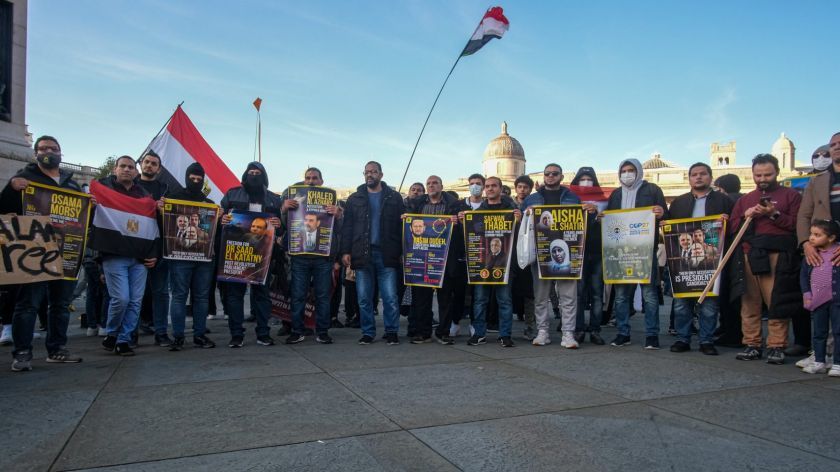Scientist in Sharm El Sheikh: ‘This climate summit seems more important than we thought’
-
 Demonstrators in London protest in favour of climate justice and against president Sisi. Photo: Alisdare Hickson, Flickr
Demonstrators in London protest in favour of climate justice and against president Sisi. Photo: Alisdare Hickson, Flickr
Scientists, lobbyists and activist groups have gathered in Sharm El Sheikh for the climate summit COP27, which started last week. The university teacher Sander Chan, who teaches environmental science in Nijmegen, is visiting a climate summit for the eighth time.
Sander Chan has been visiting the climate conferences of the United Nations since 2014. ‘For me, they have much value,’ he says on the telephone, as soon as he has found a free spot in a busy programme of presentations, meetings and panel discussions. ‘My research is not only meant for other scientists. I also want to share my results with policymakers who are seated here at the negotiating table so they can use our findings in their decision.’
Is there still hope that policy makers are listening?
‘In general, people don’t listen enough to what scientists say, otherwise we wouldn’t still be dealing with a big climate problem. But I do think that I, as a scientist, can have influence. For example, one of my research questions is under which conditions NGOs, local governments and businesses should conform to the climate policy. In that way, I can advise on how to get them involved in the climate policy.’
Why does your research focus mainly on climate actions of NGOs, local governments and businesses?
‘Globally, governments are not doing enough to prevent climate change. Even if they would execute all measures they have agreed upon in the climate agreement of Paris in 2015, we would still be dealing with a global warming between 2 and 3,5 degrees by the end of the century. That is absolutely catastrophic. Because governments don’t take enough action, it is increasingly more important that investors, businesses, cities and regions think about what they can do to reach the climate targets. Think about banks that no longer invest in fossil-based industries.’
Shouldn’t effective climate policy come from governments?
‘Eventually, yes. Many climate actions by businesses, NGOs and local governments are voluntary, and there are many that don’t take any action. Governments should actually be taking mandatory measures. But climate action outside of governments is also important. Sometimes, there are governments that do not take any climate action at all or are even anti-climate, such as Trump’s government in the United States. There were thousands of businesses, local governments, cities and universities that said: we will adhere to the climate agreement of Paris, regardless of what the federal government does. They held onto the momentum regarding climate.’
COP27
The United Nations have been organising a yearly climate summit since 1995: the so-called Conference of the Parties (COP). COP27 takes place in Sharm El Sheikh, from 6 till 18 November. The next climate summit, COP28, is next year in Dubai. During COP28, government leaders will evaluate for the first time if the common measures that have been taken are enough to reach the climate targets in the agreement of Paris.
Which themes are at the centre of this climate summit?
‘This COP seems to be more important than we first thought. This is because of the negotiations about compensation. Rich countries promised in 2009 that they would pump 100 billion dollars in poorer countries, in order to allow them to adjust to the new demands that climate change imposes. This particular goal was not met and damaged trust among these countries. During this COP, it’s therefore important to round up the financing.
A second financial matter concerns compensation: what are we going to do if the impact of climate change is already causing damage and losses right now, especially in poor countries? The latter are not responsible for climate change but they suffer from it the most. The question is: should rich countries compensate for them? Rich countries are generally not happy with this discussion because it means they have to pay.’
‘The discussion on compensation means that rich countries have to pay’
Normally, tens of thousands of activists march through the streets during a climate summit but because of the human rights violations in Egypt, that is not possible this time. How is it to attend a COP during those circumstances?
‘It’s very sad, I think. Activists are essential to increase the pressure. This year, there are indeed few demonstrations and there is no big climate march. This is partly because some activists do not get access to the COP. But exclusion also happens on a more subtle level. The prices for hotels here in Sharm El Sheikh are ten or more times higher than normal. The average NGO activist can’t afford that.’
‘It’s true that there’s more attention for human rights amongst the activists and NGOs that are present. There’s a clear call for climate justice and the protection of human rights. For example, NGOs and a number of world leaders have called upon Egypt to release political prisoners.’
‘Maybe you shouldn’t organise a COP in a country like Egypt at all, but if it does happen there should be attention dedicated to human rights violations as well.’
Translated by Willeke Roefs.




